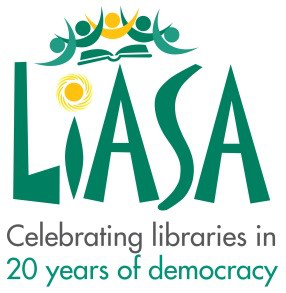-
Opening day
-
Submission deadline
The deadline for submission of abstracts have been extended until mid day 20 June.
You are hereby invited to submit proposals for papers & posters that focus on areas related to the theme of the conference.
The 16th Annual LIASA Conference aims to provide opportunities to debate, share, and learn from local and international professional colleagues and partners. All relevant stakeholders and partners are invited to participate in discussions and workshops around the proposed topics. Papers based on case studies and best practice would be given preference.
Celebrating libraries in 20 years of democracy: the dialogue continues
Dale T. McKinley (2003) writes
“The political, social and economic edifice of the apartheid system in South Africa was built on the foundation of an institutionalized violation of basic human rights. Indeed, the entire struggle against apartheid was fundamentally, a struggle for the democratic reclamation of those human rights, whether civil and political, socioeconomic and/or environmental, cultural and developmental rights”.
Caught in the chasm between apartheid and access to information, is the librarian gifted with the understanding that information is essential for growth and development. The ushering in of a political democracy, despite the proliferating use of Google, places a significant burden on the librarian for contribution to the expansion of political democracy to include economic and social democracy and, active citizenship. The challenges of growing a young democracy are much broader than the responsibility of the public librarian. The academic librarian armed with a sound ‘institutional technology infrastructure’ must contribute to growing the virtual library ensuring open access to content funded by a cash-strapped citizenry.
It has been for too long that librarians have functioned in silos. Academic librarians, in their enclaves guarding the integrity of the academic community, are oblivious to the realization of the enormous inherent potential located in their library systems to support a floundering school library system. The paucity of efficient and effective school libraries has converted public librarians into school librarians, often ‘neglecting’ their roles in developing partnerships for and with information and civil society organizations. Further, the ethos of the ‘people’s university’ is being eroded.
What are the conversations or dialogues that librarians are having with regard to their contribution to the reconstruction and development of the country? What is the library’s contribution to eliminating poverty and unemployment; providing access to housing, water, electricity, sanitation, education, health, and social protection support to the millions deprived of these basic rights under apartheid – or are there such conversations?
In celebrating 20 years of democracy, librarians, through the provision of information, must contribute to engendering social cohesion and a national identity that is representative of South Africa’s rich and diverse culture. The challenge for the ‘chameleon like librarian’ is to transform from the majestic, steadfast African baobab tree to the pliable palm and in so doing conforming to the African proverb, “The wind does not break a tree that bends”. Taking into consideration Dr Wayne Dyer’s (2011) insightful comments that when “powerful forces push you in any direction, bow rather than fight and, lean rather than break”, librarians need to free themselves from the rigidity of rules. They need to keep the inner visions of the wind to symbolize difficult situations and find alternative interventions that will positively contribute to celebrating South Africa’s democracy and affirming the human rights of the citizens of the country.
With the above as the backdrop and core theme, the Conference aims to engage in discourse on the following sub-themes:
• Contemporary library trends
• Critical thinking
• Exclusivity as a barrier to innovation
• Global librarianship
• Impact analysis
• Information, civil society and partnerships
• Information without boundaries
• Librarians as community activists
• Librarians as provocateurs for change
• Libraries as agents of change
• Libraries as commercial enterprises
• Libraries as publishers
• Libraries driving success
• Libraries in Africa
• Libraries in the space of the user
• Media freedom
• National strategy for libraries and information
• Service delivery making the connection
• Social scholarship
• Social media and librarianship
The deadline for receipt of abstract for paper presentation and poster proposals is 13 June 2014.

